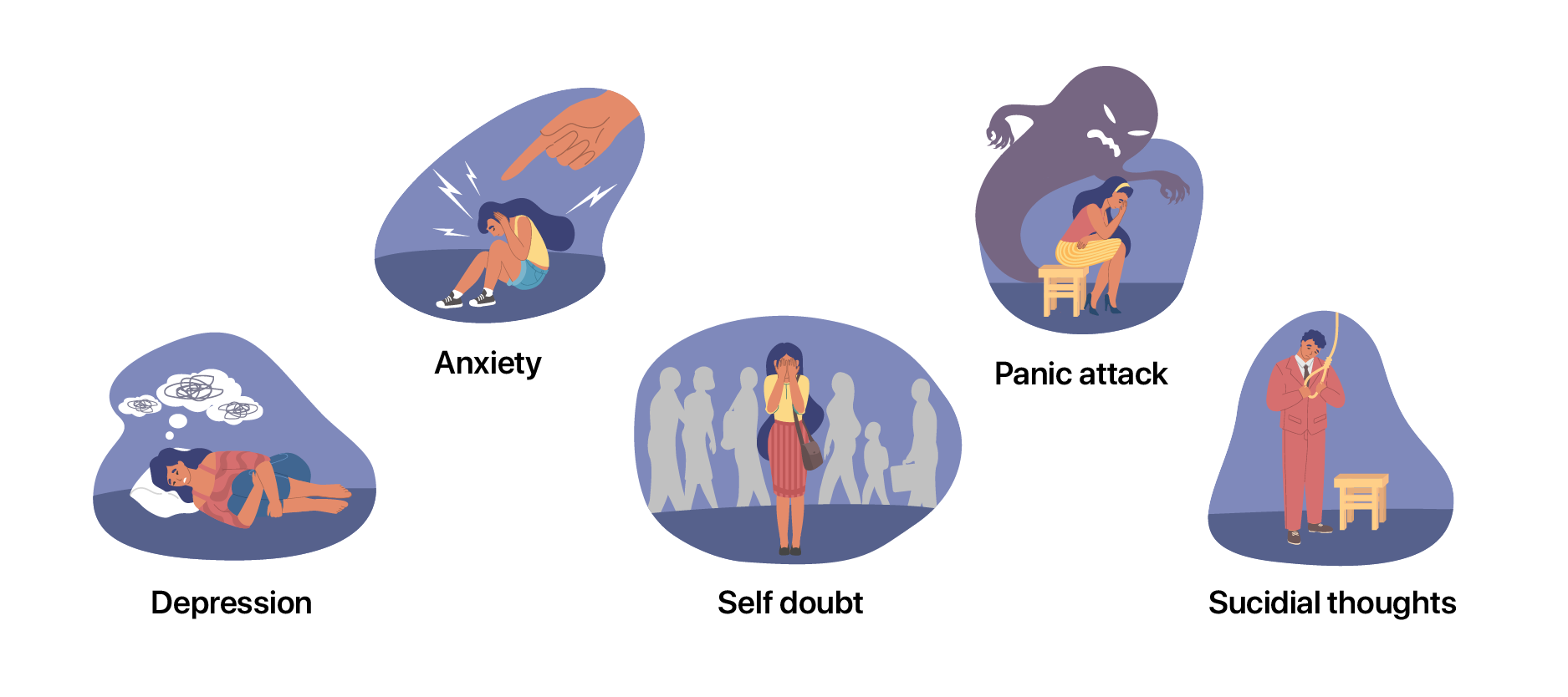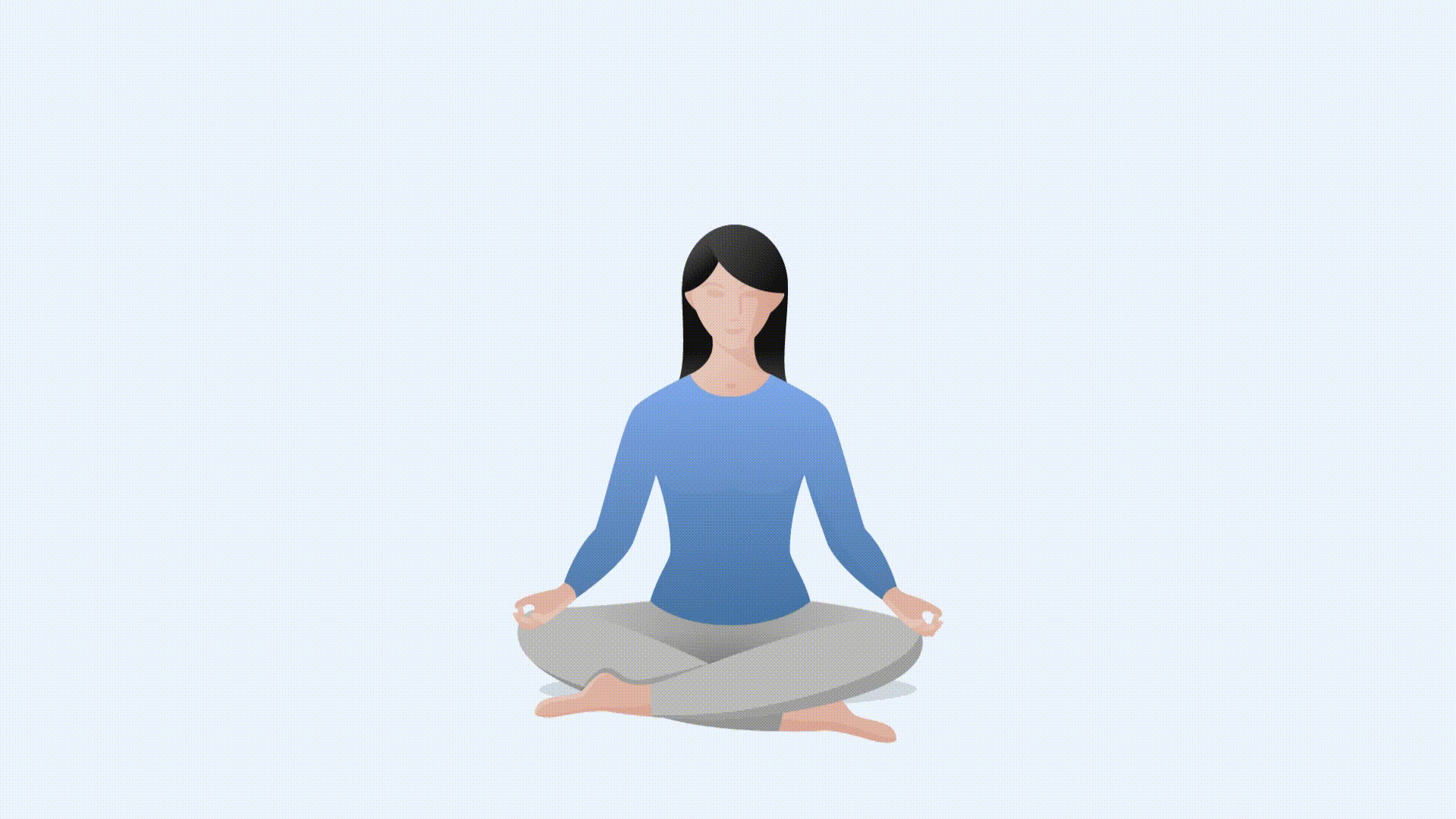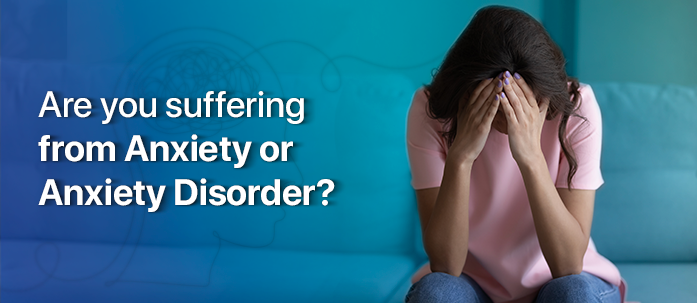Have you ever felt an instant change in the mood or an uncontrolled flow of emotion, a feeling of getting stuck, or an urge to harm yourself?
Then you are not alone!
Statistics reveal that India is regressing as per the happiness index. Can it directly correlate with increased psychological disorders like anxiety and depression?- Well, that’s still a question.
The present article revolves around anxiety disorder-related symptoms, reasons, and measures required to cope with the same
What is Anxiety and Anxiety disorder?
Anxiety is the general term used to describe feelings of stress and fear—a state of emotion you might have before an exam or an interview. Evolutionarily, these feelings were adopted as they help you prepare for danger, stay organized, and be motivated.
But what if the same emotion becomes prolonged and ruins your day-to-day life?
That’s an Anxiety disorder, a feeling of fear that hampers your quality of life by changing your mental state. A person suffering from anxiety disorder feels distant from others, loses confidence, and feels unprotected at a given time. Prolonged Anxiety could lead to other mental issues like clinical depression, extreme fatigue, and other physiological problems like stomach upset, palpitations, loss of libido, and many more.
What could cause anxiety?
Many reasons could trigger Anxiety disorder. Children are especially prone to the condition. The following are the reasons that could trigger Anxiety;
- A sudden shock
- Childhood trauma
- Genetics-Yes, blood relatives can have an impact
- Stress
- Other mental disorders
- Alcohol usage
Anxiety and hormonal changes in the body
There’s a direct impact of hormonal imbalance on anxiety, and anxiety too triggers hormonal imbalance. Although there is no discrimination among genders, the condition could affect everyone equally. However, studies reveal that women are more prone to develop Anxiety.
One possible explanation is that- natural hormones are essential in controlling overall well-being. Anxiety disorders tend to fluctuate testosterone levels, which affects sexual drive and erection. For women, fluctuating levels of testosterone induce PCOS and extreme mood swings sometimes leading to infertility. For such cases, proper diagnosis is important.
Prolonged anxiety and panic attacks force your brain to release stress hormones regularly. This, in turn, floods your nervous system with hormones and chemicals designed to help you respond to a threat. Adrenaline and cortisol are two examples. An increase in adrenaline could lead to high blood pressure, rupturing of blood vessels, heart attack, and stroke. Overproduction of cortisol can contribute to weight gain.
Anxiety disorder influences your personality by
- Influencing productivity
- Leading to the path of unhealthy self
- Altering behavior toward others
- Questioning self-worth
- Focusing more on negatives
Common symptoms of Anxiety disorder
Studies have shown that anxiety disorders psychologically affect each person differently, but there are a few common symptoms.
- Palpitations or increased heartbeat
- Hyperventilation or rapid breathing
- Restlessness or nerves
- Difficulty in concentrating
- Having a sense of danger
- Excessive tiredness and sweating

The umbrella of Anxiety disorders is wide and includes
- Panic disorder
- Post-traumatic stress disorder (PTSD)
- Obsessive-compulsive disorder (OCD)
- Separation anxiety
- Illness anxiety
- Phobia
- Generalized anxiety disorder (GAD)
- Social anxiety disorder
Five tips that can help you cope with Anxiety
- Practicing mindfulness: A type of meditation that helps you be more aware of your surroundings and induce peace. Meditation helps a person to be calmer and more progressive.
- Take proper sleep: How often have we heard that a minimum of 7 hours of sleep is essential? Well, it is scientifically proven that our body physically and psychologically repairs itself during sleep, calming and relaxing our nerves and other organs of the body.
- Write a journal: Fear is a supposition trigger for all types of anxiety and panic attacks. If you are aware of yourself, the fear factor can be automatically diminished. And the whole idea behind writing a journal is self-reflection.
- Seek gratitude: When you do good to other people, you feel good about yourself. The feeling of anxiety is more about doubting self-worth. This practice could undoubtedly improve and instill the correct attitude towards life.
- Seek medical help: In most cases, the patient requires proper attention and care from a medical expert. A medical expert can provide better solutions as mental disorders are related to hormonal disbalance that can’t be self-medicated

Yoda suggests
Anxiety could be triggered by personal life issues, workplace load, or even by an unwanted mean person in life.
If you feel anxious, talk to yourself and be open about it. Embrace the fact that you are worried about something. If you think you can’t handle it, talk to others about it- as every person will experience some sort of anxiety at a particular time. Understand; that it is okay to be vulnerable. If it’s triggering episodes, seek medical help. The whole taboo that surrounds mental disorders is nothing but a faux. One should remember that it is not the end of the world, and feelings are temporary. And anyone and everyone could come out of it.
Yoda diagnostics help in applying a holistic approach to treating Anxiety disorders and choosing the right medication while you are being treated for these symptoms. We are just a call away!






















